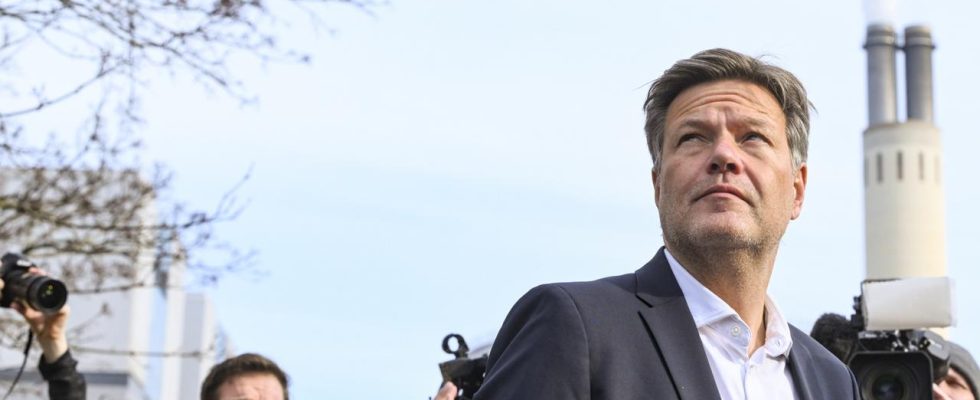Economics Minister Habeck wants to support energy-intensive industrial sectors in order to convert to climate-friendly production. So-called climate protection agreements are to be created for this – a plan with risks.
It is part of the self-image of German climate protection policy to see itself as one of the global pioneers. And from the perspective of the Ministry of Economic Affairs, Germany is setting new international standards with its climate protection agreements. “We are the first industrialized country to introduce this instrument,” Green Economics Minister Robert Habeck announced to the press at midday. I want it to sound like something big.
Undeniably, there is a lot of money involved. About billions in subsidies that are intended to help ensure that the energy-intensive industry in this country is converted into a climate-friendly way. “Today is a good day for climate protection,” said Robert Habeck. “A good day for the economy. Especially for industry. And a good day for Germany as a production location.”
Climate friendly Retrofitting is expensive
The production of paper, glass or steel uses a particularly large amount of energy and therefore emits CO2. Climate-friendly conversion is expensive for companies. With the so-called climate protection agreements, the state undertakes to cover any additional costs incurred for 15 years. This affects both the necessary investments and the subsequent operating costs.
Many climate-friendly technologies are not yet competitive, which is why converting them is not worthwhile in many industries. Industry is one of the largest emitters of greenhouse gases; without the so-called transformation of the economy, Germany will not be able to achieve its ambitious climate goals. The country is expected to become climate neutral by 2045.
Costs in the mid double digits billion range
“We need production in Germany, I want the energy-intensive industries to be there,” emphasizes the Economics Minister. “And I want production to be climate-neutral. That is value creation for the next generation. That is the industrial policy for the next generation that we are building here.”
The climate protection agreements should be an essential building block for this. Four billion euros are available for the first round of tenders, which interested companies can now apply for. Up to 19 billion euros have already been earmarked for the second round, with two more to follow. Habeck expects total costs in the mid double-digit billion range, which are to be paid out over 15 years.
A plan with risks
However: Habeck’s industrial policy for the next generation is fraught with risks. The Minister of Economic Affairs wants to make the billions available through the KTF climate and transformation fund. However, its financial resources have been rather shaky since the Karlsruhe budget verdict last November. It is becoming apparent that the KTF will not have sufficient funds available next year to finance the many climate protection projects planned by the traffic light coalition.
Another risk: The climate protection agreements are based on the assumption that the subsidized companies will need less and less help over the years and that the climate-friendly conversion will foreseeably pay off for the companies on the market. Ideally, they would even have to pay back subsidies. However, things can also turn out completely differently.
And with the climate protection agreements, the state guarantees that it will cover any additional costs incurred by the companies for 15 years. The Scientific Advisory Board at the Ministry of Economics had therefore pointed out in a report that financial obligations were difficult to estimate. In addition, the climate protection agreements are a deep intervention in the market. Habeck is trying to address such concerns by using an auction process. Those companies that can achieve the greatest greenhouse gas savings at the lowest subsidy costs should be awarded the contract.
Jung: The state cannot do so permanently subsidize
The Union parliamentary group’s spokesman for energy policy and climate protection, Andreas Jung, is not fundamentally against funding for industrial restructuring, but wants to take a close look at the climate protection agreements – if only because of the high costs in the double-digit billion range: “What is crucial is that a technology ultimately flies “Only then will she be successful,” said Jung. “The state can finance a stimulus. But it cannot permanently cover risks, it cannot permanently subsidize. And this number is already very, very high.”
The Federal Association of German Industry welcomes the start of the tender for climate protection contracts. According to BDI boss Siegfried Russwurm, extensive government support is necessary for the climate-neutral transformation of the economy.
Greenpeace calls for strict standards to be applied when awarding contracts. Only companies that rely on particularly climate-friendly technologies should be supported.
Commitments well over one legislative period
Interested companies now have four months to submit their bids. It is expected that there will be significantly more interested parties than funding in the first round of tenders. The second, much larger round of tenders is scheduled to follow at the end of the year.
It is difficult to predict whether the German climate protection agreements will set new international standards. What is clear, however, is that with the contracts the state should assume subsidy obligations that will extend far beyond the legislative period.
Martin Polansky, ARD Berlin, tagesschau, March 12, 2024 4:47 p.m

